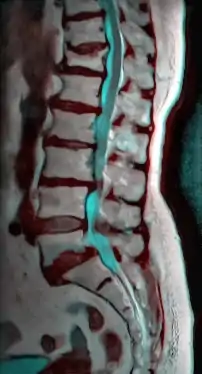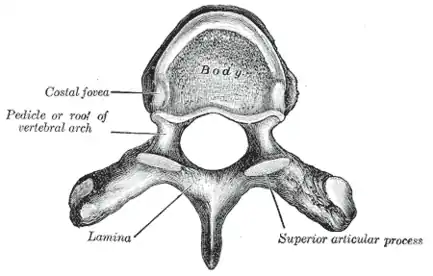Spine
The spine is a column of vertebrae in the back part of the torso (upper body). It is also called the backbone or vertebral column. There is a spinal canal that runs through the length of the spine. Inside this canal is the spinal cord. Animals that have a spine are called vertebrates, and animals that do not have one are called invertebrates. Humans have a spine, so we are vertebrates. Many vertebrates, including mammals, have intervertebral discs separating the vertebrae.


Regions
The vertebral column has five regions. These regions from top to bottom are:
- Cervical - Shown in red, this region supports the head. It is made up of 7 vertebrae. The first two, called the atlas and axis, connect the spine to the skull.
- Thoracic - Shown in blue, this region supports the ribs. It is made up of 12 vertebrae.
- Lumbar - Shown in yellow, this region is located in the lower back. It is made up of 5 vertebrae.
- Sacral - Shown in green. It is made up of 5 vertebrae that are fused together.
- Coccygeal - Shown in purple. It is made up of 3 to 5 vertebrae.
Spinal canal
The spinal column has an opening called spinal canal and this opening is used for nerves. The part of the central nervous system in the spinal column is called spinal cord.
References
- Gray's Anatomy: The Vertebral Column - The 1917 Gray's Anatomy is available via the Bartleby project. It is available with full colour diagrams. The initial version of this article was copied and pasted from the 1917 Gray's anatomy, which is in the public domain.
Other websites
![]() Media related to Vertebral column at Wikimedia Commons
Media related to Vertebral column at Wikimedia Commons
- North American Spine Society is a multidisciplinary medical organization that advances quality spine care through education, research and advocacy.
- Spinal anatomy and back pain
- Spine anatomy illustrations
- Spine anatomy Archived 2012-05-06 at the Wayback Machine
- Vertebral column basics Archived 2008-11-20 at the Wayback Machine
